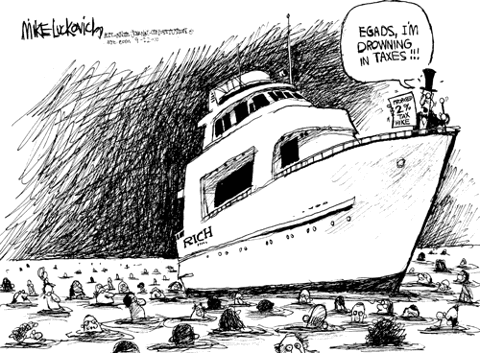

Against Monopoly
defending the right to innovate
Monopoly corrupts. Absolute monopoly corrupts absolutely.
Copyright Notice: We don't think much of copyright, so you can do what you want with the content on this blog. Of course we are hungry for publicity, so we would be pleased if you avoided plagiarism and gave us credit for what we have written. We encourage you not to impose copyright restrictions on your "derivative" works, but we won't try to stop you. For the legally or statist minded, you can consider yourself subject to a Creative Commons Attribution License.
current posts | more recent posts | earlier posts
Just barely keeping my head above water (and everybody else)

[Posted at 09/26/2010 04:27 PM by John Bennett on Against Monopoly  comments(0)]
comments(0)]
Citigroup uses copyright to censor a critic
DeLong's verdict; "Whatever you think about the DMCA, it should not be used to prune the historical record of primary sources about how various economic policies were perceived at the time." Brad then reprints the Citigroup report link here. Good for him.
[Posted at 09/25/2010 12:17 PM by John Bennett on Copyright  comments(1)]
comments(1)]
Speeding medical progress: better coordination or less IP?
[Posted at 09/24/2010 06:34 PM by John Bennett on Against Monopoly  comments(7)]
comments(7)]
An Email From a Reader
"Since content may be removed from YouTube if it is found to breach copyright or if it contains offensive material, there is scope for the public and health organisations to request the removal of pro-tobacco content containing copyright or offensive material."
It seems to be a suggestion that the ability to claim for copyright infringement should be available, not just to the author, but anybody who might find it useful as a tool for censorship.
Regards Paul Lockett
[Posted at 09/23/2010 03:03 AM by David K. Levine on IP as Censorship  comments(7)]
comments(7)]
Copying is not Theft
[Posted at 09/22/2010 10:40 PM by David K. Levine on Was Napster Right?  comments(0)]
comments(0)]
Blegging
[Posted at 09/22/2010 11:56 AM by David K. Levine on IP as a Joke  comments(0)]
comments(0)]
Pushing the limits of imitations in Switzerland
And Migros has for decades been pushing the limits of how closely it can imitate brand products, often openly making puns on brand names and besting the quality of the imitated product. And while the imitated brand holders were upset, there is little they could do and Swiss courts have been largely sympathetic to Migros. The judges are probably shopping there.
Now it seems that Migros may have overstepped some boundary. As the Tagesanzeiger reports (in German), the new line of ice cream "Jane & Mary", a clear imitation of "Ben & Jerry", will be modified once the current stock is sold. Brand holder Unilever must have made some legal threat that had some impact, but how is unclear. Migros does not need Unilever, being quite self-reliant, and there have been more blatant imitations in the past.
In any case, the next time you are in Switzerland, check out Migros and try to recognize all the imitations. And sample its goods, especially in the chocolate and dairy section.
[Posted at 09/19/2010 12:15 PM by Christian Zimmermann on Trademark  comments(0)]
comments(0)]
Goats on the Roof
[Posted at 09/17/2010 06:42 AM by David K. Levine on IP as a Joke  comments(8)]
comments(8)]
First (free speech) amendment trumps copyright
This provision clearly conflicts with Article 1 Section 8 which gives Congress the power "To promote the Progress of Science and useful Arts, by securing for limited Times to Authors and Inventors the exclusive Right to their respective Writings and Discoveries;...."
I am no lawyer, but since the first amendment was passed on March 4, 1789 after the Constitution was ratified on September 25, 1789, it would logically override that part giving Congress such power (for dates link here). Of course, there is never any certainty about how the Supreme Court may decide an issue.
Mike recommends a book which I haven't read yet, but his statement is pretty strong. He says David Lange and Jefferson Powell, the authors of No Law, "spend the first half making the compelling and detailed (if densely written) case that copyright law absolutely violates the First Amendment." They apparently backslide in the second half.
I do take personal exception to Mike's comments on the State Department officials toadying to the IP interests. As a middle aged and fairly senior diplomat, I had to try to enforce our IP agreements with the Korean government. I had no option to express an opinion, but instead was told to enforce what I was told was the law.
[Posted at 09/16/2010 02:08 PM by John Bennett on Copyright  comments(73)]
comments(73)]
IP as a joke

[Posted at 09/16/2010 07:48 AM by John Bennett on Against Monopoly  comments(0)]
comments(0)]


Most Recent Comments